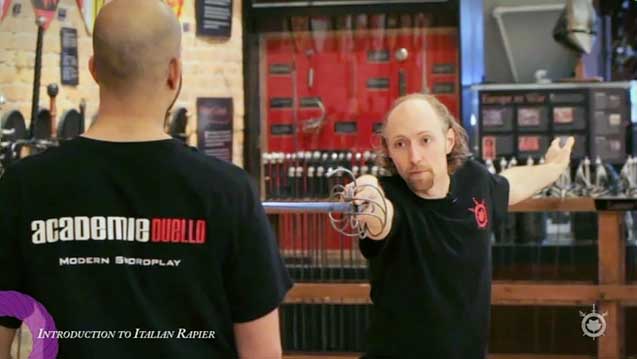At the end of January, we finished up the fourth 30-for-30 Swordplay Challenge. The Facebook group this year had over 250 members with reports coming from at least 100 of them throughout the entire month. I enjoyed reading posts from practitioners throughout the world with varying levels of experience and coming from different backgrounds and disciplines.
I took some time to reread a bulk of the training reports and compiled some interesting collections based on the diversity of training represented. I hope they're as interesting and entertaining to all of you as they were to me.
Types of Training
Participants in this year's challenge reported a lot of different types of training both solo and partnered to make it through their challenges. These included:
- Solo Sword Drilling (cutting, thrusting, target drills, etc)
- Solo Non-sword drilling (footwork, posture, isolation exercises)
- General conditioning (quite a few people reported running, kettlebells, and gym workouts)
- Sledge hammer training (yup it was a thing)
- Katas, assaults, and other choreographed forms
- Partnered drills
- Lots of sparring
- Reading historical and modern training manuals
- Translating historical manuals
- Watching training videos
- Dancing (was reported by several people. Good cross-training!)
- Juggling (though I think the person in question does 4-hours of this every day, regardless of swordplay challenges)
- Water Polo
- Live cutting
- Mounted Combat
Swords & Tools
The types of weapons and tools employed in training this year were pretty broad:
- Longsword
- Rapier
- Backsword
- Sidesword
- Weighted swords
- Sledgehammers
- Balls
- Weights
- Katana
- Saber
- Shinai
- Spadone
- Montante
- Messer
- Storta
- Cutlass
- Dane Axe
- Poleaxe
- Dagger
- Sickle
- Epee
- Dussack
- Lots of improvised drilling devices including dowels, kids wooden swords, ladles and pot lids.
Training Locations
When someone is intent to get their training in, they'll do it no matter where they are. The following locations were reported for physical drilling (not including reading locations):
- Schools, studios, and halls
- Parks and other outdoor green spaces
- Bus stops
- Amusement park line-ups
- Movie line-ups
- Moving vehicles
- Planes
- Garages
- Parking lots
- Living rooms, bedrooms, and dining rooms
Historical Sources Mentioned
People mentioned many different sources both for their reading as well as for guiding their physical training. These included:
- Marozzo
- Capo Ferro
- Fiore dei Liberi
- Leichtenauer (non-specific source)
- Docciolini
- Salvator Fabris
- Viggiani
- Dall'Aggochie
- Annonymous Bolognese
- Alfred Hutton
- Ferraro
- Joachim Meyer
- Von Auerswald
- Angelo
- I.33
- Paulus Hector Mair
- Nicoletto Giganti
- Paschen
- Filipo Vadi
Countries
This was a little harder to put together in a timely fashion without going through everyone's profiles. My results are based on countries mentioned:
- Indonesia
- Israel
- Spain
- Canada (BC, Alberta, Ontario, New Brunswick)
- USA (MI, MA, NY, WA, WI, FL, TX, CA, MO, UT, NC, NJ, ND, MN, RI)
- Germany
- Russia
- Netherlands
Thanks again to everyone who participated, it was inspiring and entertaining. I hope that people not only got results but set a new habit for themselves to bring into the new year.
Devon
